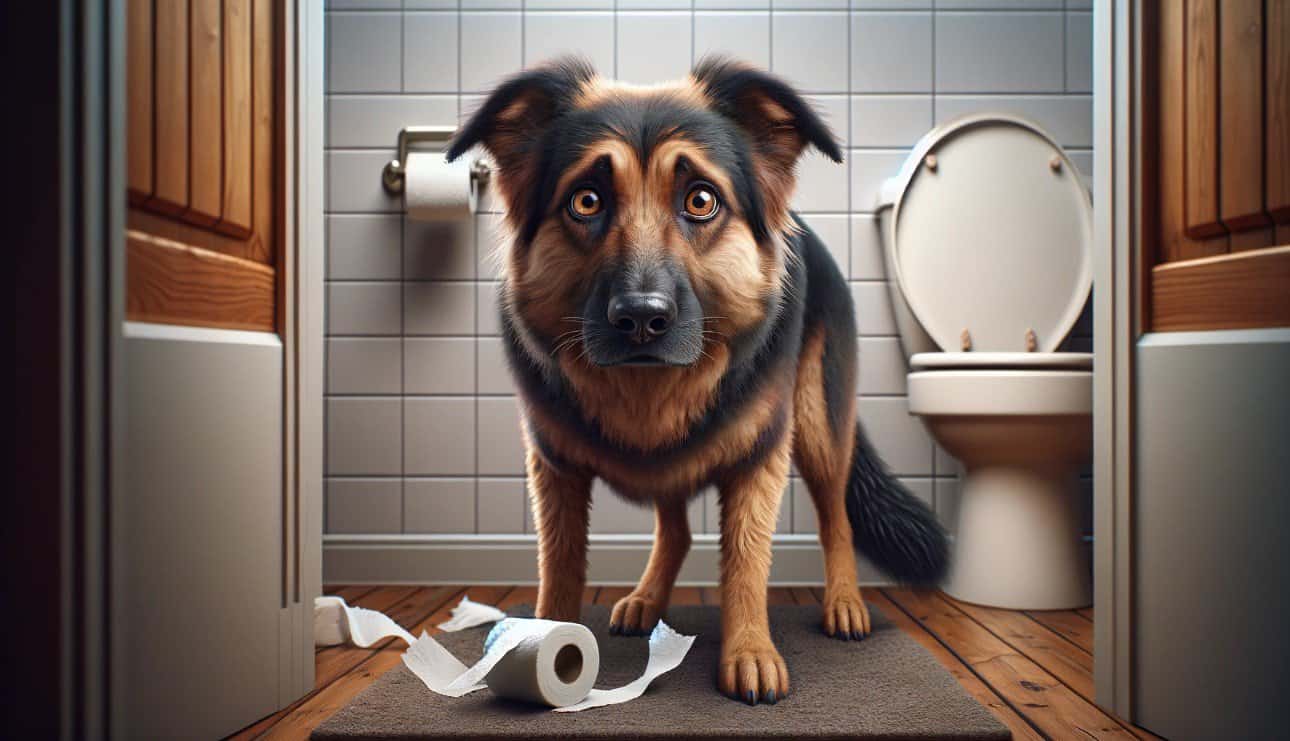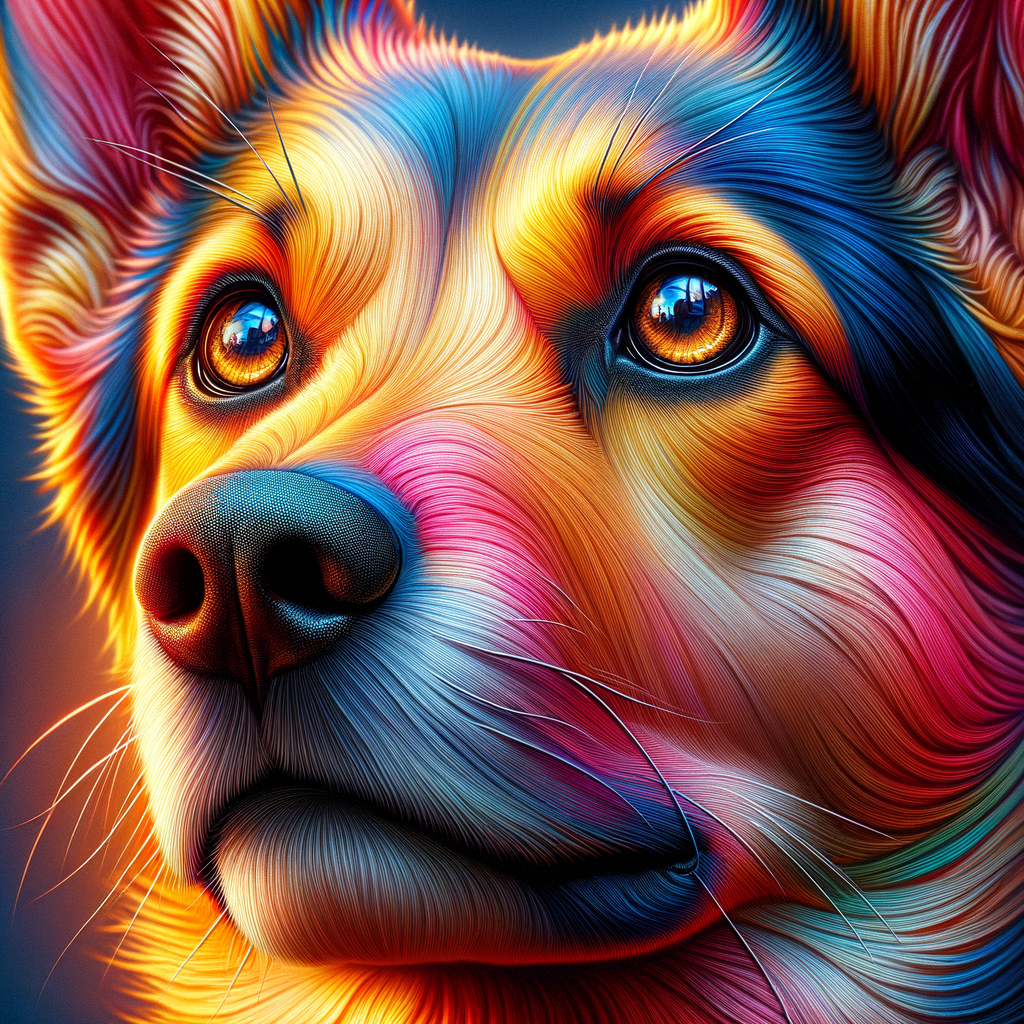Hey there, fellow dog parent. I know how alarming it can be to discover your furry friend has black stool. Don’t panic! I’m here to guide you through some vet-recommended home remedies for treating your dog’s black stool. As a holistic veterinarian, I’ve helped countless pet parents navigate this issue, and I’m confident we can find a solution for your pup too. Whether it’s a simple dietary adjustment or the addition of natural supplements, we’ll explore all possible remedies. So stick around, and let’s get your dog back to their happy, tail-wagging self!

Common Causes of Black Stool in Dogs
Understanding the root cause of your dog’s black stool is the first step towards finding an effective solution. Let’s break down the common causes into two categories: dietary and medical.
Dietary Causes of Black Stool in Dogs
Your dog’s diet plays a significant role in the color and consistency of their stool. Certain foods and treats, particularly those rich in iron or activated charcoal, can darken your dog’s stool. Sudden changes in diet can also result in black stool, as your pet’s digestive system may struggle to adapt to the new food. Feeding your dog human food, especially spicy or heavily seasoned food, can also lead to black stool.
Medical Causes of Black Stool in Dogs
Medical issues can also cause black stool in dogs. The most common cause is gastrointestinal bleeding, which turns the stool black due to the digestion of blood. This can be a symptom of various health issues, such as stomach ulcers, bowel obstructions, or parasites.
Certain medications, like Pepto-Bismol or iron supplements, can also cause black stool. If your dog has recently started a new medication and you’ve noticed a change in their stool color, it’s worth discussing with your vet.
Understanding the cause of your dog’s black stool is crucial in determining the best course of action. It’s always best to consult your vet if you’re unsure, to rule out any serious health issues.
Key Takeaways
- Dietary changes, especially those involving iron-rich food or human food, can cause black stool in dogs.
- Medical issues, like gastrointestinal bleeding or certain medications, are a common cause of black stool.
- Always consult your vet if you’re unsure about the cause of your dog’s black stool.
Your furry friend relies on you to keep them healthy and happy. Knowing the possible causes of their black stool can help you make informed decisions about their diet and healthcare. Remember, when in doubt, always consult a professional. Your dog’s health is worth it!
Vet Recommended Home Remedies for Black Stool
Dietary Adjustments for Dogs with Black Stool
Noticing a change in your dog’s stool color can be worrisome. However, before you panic, remember that certain diet changes can help manage this condition. If your dog’s stool is black due to dietary reasons, consider making some adjustments.
Firstly, ensure your dog is eating a balanced, high-quality diet. This means providing them with food rich in protein, fiber, and essential nutrients. Avoid feeding them human food, especially those that are spicy or high in fat, as these can upset their digestive system and lead to black stool.
Secondly, try to introduce new foods gradually. A sudden change in diet can cause digestive upset, resulting in black stool. Start by mixing a small amount of the new food with their current food, then gradually increase the proportion over a week or so.
Lastly, consider adding digestive enzymes to your dog’s meals. These can help break down food more effectively, reducing the chance of digestive issues and black stool.
Natural Supplements for Dogs with Black Stool
In addition to dietary changes, certain natural supplements can also help manage black stool in dogs. However, always consult your vet before starting any new supplement regimen.
One beneficial supplement is probiotics. They can help restore balance to your dog’s gut flora, improving digestion and potentially reducing the occurrence of black stool.
Another recommended supplement is psyllium husk. This high-fiber supplement can help regulate your dog’s bowel movements and improve stool consistency.
Omega-3 fatty acids, found in fish oils, can also be beneficial. They have anti-inflammatory properties, which can help soothe an irritated digestive tract.
Remember, while these home remedies can be helpful, they are not a substitute for professional veterinary care. If your dog’s black stool persists, seek veterinary attention immediately.
Hydration plays a pivotal role in your dog’s overall health, especially when dealing with digestive issues like black stool. This section will focus on the importance of hydration in dogs with black stool and how to ensure your dog remains adequately hydrated.
How Hydration Affects Dog’s Stool
Water is crucial to a dog’s digestive system. It helps soften the food, making it easier for the dog to digest and absorb nutrients. A dehydrated dog may experience constipation, leading to hard, dry stools that can turn black due to straining. Furthermore, dehydration can cause gastrointestinal bleeding, another common cause of black stool in dogs. Therefore, maintaining proper hydration is a key element in dog black stool treatment home remedies.
Ensuring Adequate Hydration for Dogs with Black Stool
Ensuring your dog is properly hydrated involves more than just providing a bowl of water. Here are some tips to make sure your dog stays hydrated:
- Always provide fresh water: Always make sure your dog has access to fresh, clean water. Change the water at least twice a day and clean the bowl regularly to prevent the growth of bacteria.
- Encourage frequent drinking: Encourage your dog to drink water frequently. You can do this by adding a splash of chicken broth to the water or using a pet drinking fountain, which can make drinking more appealing.
- Feed wet food: If your dog is not a big drinker, consider feeding them wet food. Wet food contains a high amount of water which can help increase your dog’s overall water intake.
- Monitor for dehydration: Regularly check your dog for signs of dehydration such as dry gums, lethargy, and loss of skin elasticity. If your dog shows any of these signs, seek immediate veterinary attention.
Remember, while hydration is essential in dog black stool treatment home remedies, it’s not a cure-all. If your dog’s black stool persists, it’s crucial to seek professional help as it could indicate a serious underlying health issue.

Probiotics and Digestive Health in Dogs
As a dog parent, you might have heard about the benefits of probiotics for your four-legged friend. They play a crucial role in maintaining the overall health of your dog, especially when it comes to digestive issues. Let’s delve into how probiotics can help treat black stool in dogs and which ones are the best.
Role of Probiotics in Treating Black Stool in Dogs
Probiotics are beneficial bacteria that thrive in your dog’s gut. They aid in digestion by breaking down food compounds that your dog’s body can’t process alone. When your dog’s gut health is compromised, it can lead to various digestive issues, including black stool.
Black stool in dogs can be a sign of intestinal bleeding, which is often caused by gastrointestinal upset. Probiotics can help by restoring the balance of gut flora, reducing inflammation, and promoting healthy digestion. They can also strengthen the gut lining, preventing harmful bacteria from causing further damage.
However, it’s important to remember that while probiotics can help manage symptoms, they should not replace a visit to the vet. If your dog’s black stool persists, seek professional help immediately.
Best Probiotics for Dogs with Black Stool
When it comes to choosing the right probiotics for your dog, it’s essential to consider the strains of bacteria present in the supplement. Some beneficial strains for dogs include:
- Lactobacillus acidophilus: This strain helps prevent harmful bacteria from attaching to the gut lining and promotes the absorption of essential nutrients.
- Bifidobacterium animalis: Known for its ability to strengthen the immune system and improve digestion.
- Enterococcus faecium: This strain aids in nutrient absorption and can help reduce diarrhea.
Probiotic supplements for dogs are available in various forms, including powders, capsules, and chews. Remember to follow the recommended dosage on the product label and consult with your vet if you have any concerns.
One of the top vet-recommended probiotics is Purina Pro Plan Veterinary Diets FortiFlora. It contains a strain of probiotic that promotes a healthy immune system and aids in managing diarrhea. Another popular choice is Nutramax Proviable-DC, a multi-strain probiotic that supports healthy gut flora.
Incorporating probiotics into your dog’s diet can be a beneficial home remedy for black stool. However, it’s essential to monitor your dog’s condition and seek veterinary advice if the black stool continues. Remember, probiotics are a part of the solution, not a standalone treatment.
Dietary Fiber for Dogs with Black Stool
If your dog is experiencing black stools, incorporating dietary fiber into their diet could be a beneficial home remedy. Fiber plays a crucial role in maintaining a healthy digestive system for your furry friend. Let’s explore the benefits of dietary fiber and identify high-fiber foods that can help manage your dog’s condition.
Benefits of Dietary Fiber for Dogs with Black Stool
Dietary fiber can provide several benefits for dogs dealing with black stools. Firstly, fiber adds bulk to your dog’s stool, which can help normalize bowel movements. This is particularly beneficial if your dog’s black stool is a result of constipation or diarrhea. Secondly, fiber can aid in the absorption of toxins and other harmful substances in the digestive tract, potentially reducing the occurrence of black stools. Lastly, fiber can promote the growth of beneficial bacteria in the gut, improving overall digestive health.
High Fiber Foods for Dogs with Black Stool
Now that we understand the benefits of fiber, let’s discuss high-fiber foods that you can incorporate into your dog’s diet. Please remember to introduce these foods gradually and under the guidance of a vet to avoid upsetting your dog’s stomach.
- Pumpkin: Pumpkin is a great source of fiber and is gentle on a dog’s digestive system. You can add pureed pumpkin (not pumpkin pie filling) to your dog’s regular meals.
- Sweet Potatoes: Cooked sweet potatoes are another excellent source of dietary fiber. They’re also packed with vitamins and minerals beneficial for your dog’s overall health.
- Green Beans: Green beans are low in calories but high in fiber. They can be served steamed or raw, as long as they’re cut into bite-sized pieces.
- Apples: Apples provide a good amount of fiber and are also hydrating. However, remember to remove the seeds and core before feeding them to your dog.
- Carrots: Carrots are another high-fiber option that can be served raw, cooked, or even frozen for a refreshing treat.
Using dog black stool treatment home remedies like dietary fiber can be a practical approach to managing your dog’s condition. However, it’s essential to consult with your vet before making any significant changes to your dog’s diet. They can provide guidance based on your dog’s specific needs and condition.

When to Seek Professional Help for Dogs with Black Stool
While home remedies can provide some relief, it’s crucial to know when professional help is necessary. Sometimes, a dog’s black stool may indicate something more serious that requires immediate veterinary attention.
Signs Your Dog Needs Veterinary Attention
Consistent Black Stool: If your dog’s stool remains black even after trying home remedies, it’s time to consult your vet. This could be a sign of internal bleeding or other serious health issues.
Changes in Behavior: If your dog is lethargic, refusing to eat, vomiting, or showing signs of abdominal pain along with black stool, these could be symptoms of a more serious condition.
Presence of Blood: If the black stool is tarry and has a foul smell, it may contain digested blood, a condition known as melena. This requires immediate veterinary attention.
Dehydration: If your dog is showing signs of dehydration such as dry gums, sunken eyes, and loss of skin elasticity, it’s vital to seek professional help immediately.
What to Expect at the Vet’s Office
When you take your dog to the vet, be prepared to provide a thorough history of your dog’s health, dietary habits, and recent behavior. The vet will likely perform a physical examination and may recommend diagnostic tests such as a stool analysis, blood tests, or an ultrasound to identify the cause of the black stool.
The treatment plan will depend on the vet’s findings. If the black stool is due to a dietary issue, the vet might suggest a diet change or recommend specific dog black stool treatment home remedies. If a medical condition is the cause, your dog may need medication, surgery, or other treatments.
Remember, while it’s beneficial to try home remedies, they should never replace professional veterinary care. If your dog’s symptoms persist or worsen, always consult your vet.
Prevention of Black Stool in Dogs
Regular Health Checks for Dogs
Prevention is always better than cure, right? So, the same applies to our four-legged friends. Regular health checks are paramount in keeping our dogs healthy and preventing issues like black stool. It’s advisable to take your dog for a check-up every 6 to 12 months.
During these visits, the vet will typically conduct a comprehensive physical examination, which may include blood tests, urine tests, and fecal tests. These tests can reveal potential health issues that may be causing black stool in your dog or could lead to it in the future.
Regular deworming is also crucial, as parasites can cause black stool. Your vet can guide you on the best deworming schedule for your dog based on its lifestyle, age, and health status.
Maintaining a Balanced Diet for Dogs
Feeding your dog a balanced diet is another crucial aspect of preventing black stool. A well-balanced diet should include high-quality proteins, carbohydrates, fats, vitamins, and minerals. It’s essential to avoid foods that are toxic to dogs like chocolate, onions, grapes, and some types of nuts, among others.
Remember that a sudden change in your dog’s diet can cause digestive issues, including changes in stool color. So, if you plan to change your dog’s diet, do it gradually over a week or two.
Also, monitor your dog’s eating habits. Overeating can lead to obesity, which can cause various health issues, including digestive problems. On the other hand, underfeeding can lead to malnutrition, which can also result in digestive issues.
Finally, ensure that your dog has access to fresh water at all times. Hydration plays a crucial role in digestion and can help prevent black stool.
Remember, the best defense against black stool is a good offense. Regular vet check-ups and a balanced diet are your best weapons in this fight. And, always be vigilant about any changes in your dog’s stool or overall health. If you notice anything out of the ordinary, it’s better to be safe than sorry. Contact your vet immediately.
As a dog parent, it’s our responsibility to ensure our furry friends are healthy and happy. We can achieve this by being proactive in their healthcare and feeding them a nutritious diet. So, let’s keep those tails wagging and those stools healthy!
Frequently Asked Questions
- Q: What could be causing my dog to have black stool?
A: Black stool in dogs can be caused by various factors such as gastrointestinal bleeding, ingestion of certain medications or substances, or even a diet rich in iron or blood. It is important to consult a veterinarian for a proper diagnosis. - Q: Are there any home remedies I can try to help my dog with black stool?
A: While home remedies may provide temporary relief, it is crucial to identify and address the underlying cause of black stool. However, you can try feeding your dog a bland diet consisting of boiled chicken and rice, along with probiotics to promote healthy digestion. Always consult with a vet before trying any home remedies. - Q: Can I give my dog over-the-counter medications for black stool?
A: It is not recommended to give your dog over-the-counter medications without consulting a veterinarian first. Some medications can be harmful to dogs or may not address the underlying cause of black stool. A professional evaluation is necessary to determine the appropriate treatment. - Q: How can I prevent black stool in my dog?
A: Preventing black stool involves maintaining a healthy diet for your dog, avoiding feeding them table scraps or foods that are known to cause gastrointestinal issues. Regular veterinary check-ups, deworming, and timely treatment of any underlying health conditions are also essential in preventing black stool. - Q: When should I seek veterinary care for my dog’s black stool?
A: It is recommended to seek veterinary care if your dog’s black stool persists for more than a day or two, is accompanied by other concerning symptoms such as vomiting, diarrhea, lethargy, or loss of appetite, or if you notice any changes in their behavior or overall health.
